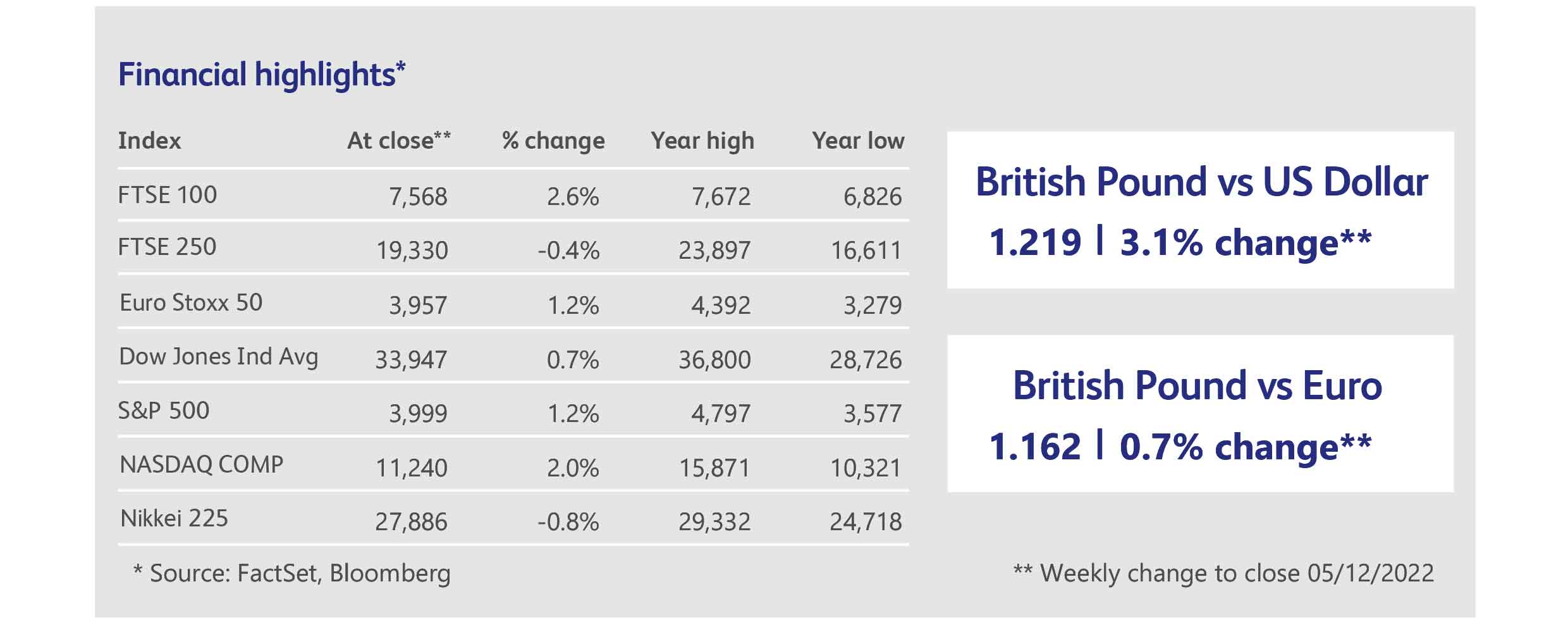
6 December 2022
Image by dropbotdean on Freepic
The markets were again driven by hopes of an easing in interest rate policy at the US Federal Reserve, as Fed Chairman Powell appeared to soften his stance in a speech in Washington DC last week. US government bonds had another good week. Their yields have been on a declining trend now for almost two months and, globally, other government bonds have mostly moved in lockstep with the US. Global stock markets were also willing recipients of the news. The S&P 500 is now down 17% for the year to date, but most of that decline has been caused by the technology sector. The more old-economy constituents of the Dow Jones Industrial Average are down only 6% for the year, not far off their European equivalents.
Not everybody thought that Powell’s speech was all good news, however. Markets were very willing to take on board his comments that the most important central bank in the world would slow the pace of rate increases this month, but ignored his subsequent warning that what matters is not so much the pace of rate rises but, rather, how high rates will eventually go. When markets have wilfully ignored Powell in the recent past, he has tended to reiterate his comments in a more forthright tone. Such corrections can send markets into a tailspin, as happened in August, after a speech by Powell at a conference wiped $2 trillion dollars off the value of global stock markets in a matter of hours.
Stock markets could also have chosen to focus on the monthly US employment data, a closely-watched indicator of the health of the American economy. Last week’s data constituted a positive shock, with the US economy creating 263,000 jobs in November, far above the expectations of economists. More importantly, average hourly pay surged during the month, quite the opposite of what the Federal Reserve is hoping to see in its battle against inflation. Economists will now have to downgrade their expectations for an American recession next year and, possibly, upgrade their estimates for the ultimate level of interest rates. Good news for the economy is, currently, bad news for markets but the initial swoon in stock markets was soon erased. Such optimism inevitably encouraged speculation about the possibility of a “Santa rally” in equities, something that has happened more often than not over the past few years.
But if stock markets in the developed world are seeming a tad optimistic, that is nothing compared with China where euphoria has taken hold. The anti-lockdown protests of last week largely fizzled out and, surprisingly, the government’s next move was to give some ground to the protesters with the further relaxation of Covid restrictions. Moreover, the tone of government officials has softened notably, with President Xi Jinping himself saying that the virus is no longer as lethal as earlier variants. The Hang Seng China Enterprises index, which represents Chinese stocks listed in Hong Kong, surged by 6% during the week, led by industry sectors that stand to gain most from the opening-up of the economy. The index had already gained 29% in November, its best monthly return since 2003. As the week came to an end, news that the US and European Union were looking at implementing new tariffs on Chinese steel and aluminium produced only a very mild negative reaction.

Excitement is growing around the pharmaceutical industry’s efforts to counter the effects of Alzheimer’s disease. Eli Lilly & Co was the latest pharmaceutical company to report successful test results for an experimental drug that slows and even reduces the build-up of harmful proteins in the brain associated with Alzheimer’s. Eli Lilly shares are currently trading at their all-time highs, valuing the company at $356 billion, and are up 36% for the year to date.
Online food delivery company DoorDash became the latest technology company to reduce its workforce. About 6% of the workforce will be laid off as losses mount, despite the company controlling a majority of the American market for the home delivery of meals and seeing its order volumes grow by 27% in the third calendar quarter.
Elon Musk pivoted back from Twitter to Tesla with his announcement of the company’s first sale of an electric lorry. Five years in the making, Musk claimed that a fully-laden Tesla truck had managed a range of 500 miles in testing. Musk had previously estimated that Tesla might sell 50,000 of the vehicles a year by 2024. Meanwhile, his Twitter escapade continues to make the headlines, with this week’s focus on a spat between Musk and one of Twitter’s largest advertisers, Apple.
The world’s most watched measure of stock market volatility, the so-called VIX index, has fallen by over 40% since its most recent peak in October, and is now below the levels reached in January. The index tracks the volatility implied by options trading on the S&P 500 stock market index, and its decline is often regarded as a sign of growing confidence among investors.
Highlights
Calendar
This publication is intended to be Walker Crips Investment Management’s own commentary on markets. It is not investment research and should not be construed as an offer or solicitation to buy, sell or trade in any of the investments, sectors or asset classes mentioned. The value of any investment and the income arising from it is not guaranteed and can fall as well as rise, so that you may not get back the amount you originally invested. Past performance is not a reliable indicator of future results. Movements in exchange rates can have an adverse effect on the value, price or income of any non-sterling denominated investment. Nothing in this document constitutes advice to undertake a transaction, and if you require professional advice you should contact your financial adviser or your usual contact at Walker Crips. Walker Crips Investment Management Limited is authorised and regulated by the Financial Conduct Authority and is a member of the London Stock Exchange. Registered office: Old Change House, 128 Queen Victoria Street, London, EC4V 4BJ. Registered in England and Wales number 4774117.
Important Note
No news or research content is a recommendation to deal. It is important to remember that the value of investments and the income from them can go down as well as up, so you could get back less than you invest. If you have any doubts about the suitability of any investment for your circumstances, you should contact your financial advisor.